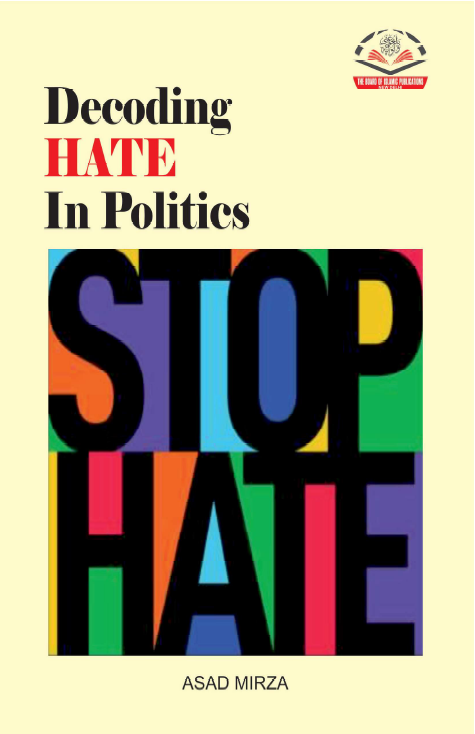Book: Decoding HATE in Politics
Author: Asad Mirza
Publisher: The Board of Islamic Publications, New Delhi
ISBN: 978-81-946797-7-6
Pages: 200
Price: Rs 295/-
Reviewed by Suhail Anjum
The scourge of Islamophobia has increased manifold globally in the recent times. Though it started from the West, but slowly it has crept into the political narrative of countries like India, too.
However, doubts still abound about what actually constitutes Islamophobia and what should be its correct definition. This work aims to clear misconceptions about Islamophobia and tries to make it easier to understand what the word actually means.
In addition, it also traces the growth of Islamophobia in India particularly and how it has affected the Muslim minority in India, and what are its ramifications in the long-run for the country and its citizens.
The book, Decoding HATE in Politics, comprising 11 chapters, analyses what constitutes Islamophobia, its growth globally and nationally.
At global level, it analyses its growth from the period of Proto-Islamophobia to the Cold War Islamophobia and the Clash of Civilisations Thesis, and then dissects the concept in the post 9/11 Period.
At national level, the author has given a detailed perspective and history of Islamophobia in India during the colonial period and how the Partition of the country helped influence its growth in India. The author also traces the attitude of the Indian polity towards Islamophobia besides analysing the strategy of the Hindu nationalists to secure power, using it to their advantage.
Further, the book analyses the social condition of the Indian Muslims, recent controversial actions taken with regard to Muslims, reasons behind the recent outbursts of violence, through mob lynching and other heinous crimes against the minorities in India and how the world is responding to the rising discrimination in India.
The book also traces the current Islamophobic and political trends, how Islamophobia is hurting India’s foreign policy, various government policies and actions targeting minorities, the bias present in the judicial and police system, growth of Hindu vigilantes, and the role of the Indian media in promoting Islamophobic content in the public domain.
The salient feature of the book is that it provides a review of the Islamophobic incidents in the country in 2021, 2022 and 2023, with a detailed analysis and graphic representations and a detailed review of various campaigns, spread of hate language and speech and strategies of the Hindutva lobby against the Indian minorities. This in itself is an important work, as we need to preserve this information for the coming generations.
The author also traces different efforts at societal level to combat Hate Speech in India, which requires a multifaceted approach involving legal reforms, effective enforcement, community engagement, and public education and most important – the political will. By addressing these challenges, India can work towards building a more inclusive and respectful society.
Asad Mirza, in this book, has pithily and dedicatedly covered all the aspects related to the rise of Islamophobia globally and in India, accompanied with extensive research. He has also provided latest statistics related to Hate Crimes and Speeches in India, based on inputs from various organisations working to cover all aspects of increasing Islamophobia in India.
The readers would have an insightful, impartial and analytical experience, as the theories and facts have been expressed in a very nuanced and impartial manner, bringing to light all relevant aspects of the issue.




